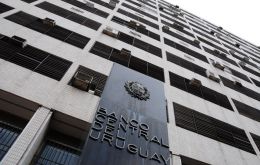MercoPress. South Atlantic News Agency
Tag: Central Bank of Uruguay
-
Wednesday, August 28th 2024 - 09:36 UTC
BCU's new VP insists the peso/dollar exchange rate is ruled by supply and demand

Uruguay's Central Bank Vice President Martín Inthamoussu said Tuesday that the exchange rate between the local peso and the US dollar was “set by supply and demand.” He made those remarks minutes after taking up his new position and pledged to work to keep inflation low amid financial stability.
-
Thursday, March 28th 2024 - 11:31 UTC
Uruguayan rural producers affected by stronger local currency

Uruguay's rural producers underlined that the constant appreciation of the local peso against the US dollar was detrimental to their exporting activities and insisted that the appropriate exchange rate should be US$ 1 = UY$ 58 instead of UY$ 37.5, which represents a 3.9% drop so far this year.
-
Friday, September 15th 2023 - 11:10 UTC
Drought strikes: Uruguay's economy shrinks by 2.5% in Year-on-Year analysis

The Central Bank of Uruguay has unveiled concerning economic data, revealing a 2.5% year-on-year decline in the country's Gross Domestic Product (GDP) for the second semester of 2023. The figures, released on Thursday, shed light on the adverse effects of the drought on Uruguay's economic landscape.
-
Friday, March 31st 2023 - 16:04 UTC
Two-thirds of high-net-worth individuals investing in Uruguay are Argentinean: see details

The sector of investment advisors and portfolio managers in Uruguay grew in the number of clients and employees last year. This sector currently manages the money of 36,170 clients, 63% of whom are Argentine, with a total of US$ 28.93 billion invested in different instruments.
-
Wednesday, March 29th 2023 - 10:58 UTC
Uruguay's Executive to cover for Central Bank's deficit

Uruguay's Executive Branch Tuesday admitted the Central Bank (BCU) reserves were below their legal threshold by Dec. 31, 2022, and a capitalization plan was therefore needed.
-
Friday, December 16th 2022 - 09:35 UTC
Uruguay's economy unchanged since second quarter of 2022

Uruguay's Central Bank (BCU) Thursday issued a report showing the country's economy for the third trimester of 2022 “remained at similar levels to those of the second quarter of the year.”
-
Tuesday, December 13th 2022 - 09:20 UTC
Uruguayan exporters worried about falling US dollar

The Uruguayan Exporters Union (UEU) Monday expressed its concern about the current parity between the local currency and the US dollar which was in its view affecting foreign trade.
-
Saturday, October 8th 2022 - 10:16 UTC
Uruguay launches stamp, announces coin commemorating Andes plane crash

Uruguayan President Luis Lacalle Pou Friday took part in a ceremony marking the 50th anniversary of the so-called Andes tragedy, an airplane crash that made history since many victims survived after being left for dead.
-
Saturday, September 17th 2022 - 10:15 UTC
Uruguay's economy grows 7.7% in second quarter of 2022

In its National Accounts report published Friday, the Central Bank of Uruguay (BCU) announced that the country's economy had grown 7.7% in the second quarter of 2022 “mainly due to the high yields achieved in the soybean harvest.”
-
Wednesday, August 31st 2022 - 10:10 UTC
Uruguayan economic growth expected to continue

Uruguay's Central Bank (BCU) President Diego Labat said Tuesday that he expected economic growth to remain steady and heralded that inflation by the end of 2022 will be below the level “we have today.”
